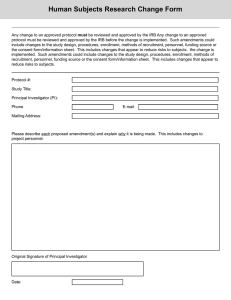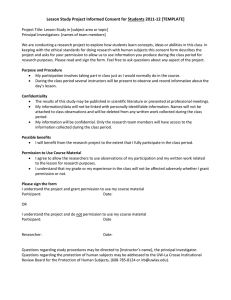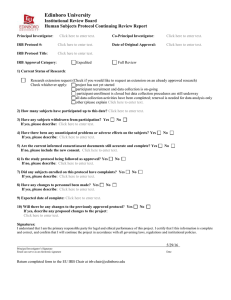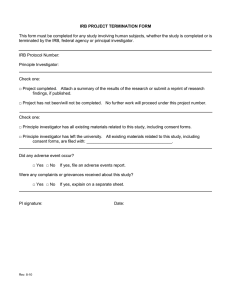Research Subject Informed Consent Form
advertisement
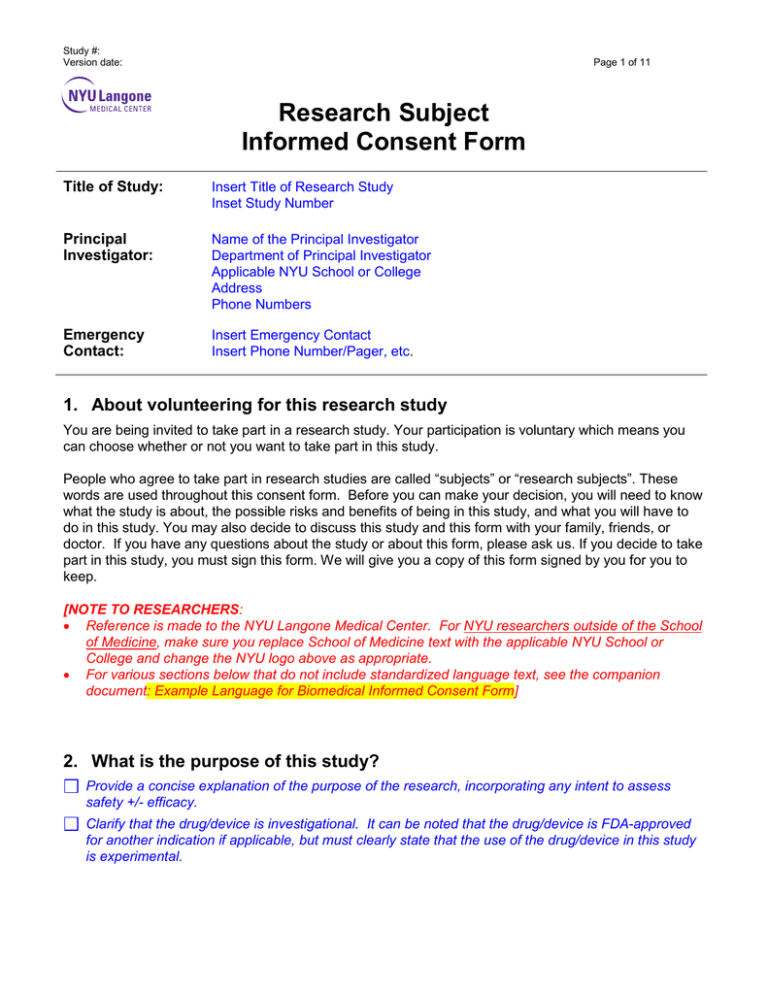
Study #: Version date: Page 1 of 11 Research Subject Informed Consent Form Title of Study: Insert Title of Research Study Inset Study Number Principal Investigator: Name of the Principal Investigator Department of Principal Investigator Applicable NYU School or College Address Phone Numbers Emergency Contact: Insert Emergency Contact Insert Phone Number/Pager, etc. 1. About volunteering for this research study You are being invited to take part in a research study. Your participation is voluntary which means you can choose whether or not you want to take part in this study. People who agree to take part in research studies are called “subjects” or “research subjects”. These words are used throughout this consent form. Before you can make your decision, you will need to know what the study is about, the possible risks and benefits of being in this study, and what you will have to do in this study. You may also decide to discuss this study and this form with your family, friends, or doctor. If you have any questions about the study or about this form, please ask us. If you decide to take part in this study, you must sign this form. We will give you a copy of this form signed by you for you to keep. [NOTE TO RESEARCHERS: Reference is made to the NYU Langone Medical Center. For NYU researchers outside of the School of Medicine, make sure you replace School of Medicine text with the applicable NYU School or College and change the NYU logo above as appropriate. For various sections below that do not include standardized language text, see the companion document: Example Language for Biomedical Informed Consent Form] 2. What is the purpose of this study? Provide a concise explanation of the purpose of the research, incorporating any intent to assess safety +/- efficacy. Clarify that the drug/device is investigational. It can be noted that the drug/device is FDA-approved for another indication if applicable, but must clearly state that the use of the drug/device in this study is experimental. Study #: Version date: Page 2 of 11 3. How long will I be in the study? How many other people will be in the study? Provide expected duration of a subject’s involvement with the study Provide expected total duration of study. Provide the expected total number of subjects in study. Include number of subjects at NYULMC. 4. What will I be asked to do in the study? Provide a high level overview of the major elements of the study and what is expected of the subject (i.e. note here only the major procedures and milestones). After the general overview, list each study visit separately and identify by visit number/name. Include for each visit: The amount of time the subject will be at the visit Activities and procedures to be conducted during the visit Any other relevant information pertaining to that individual study visit. Describe each test/procedure in layman’s terms. Clearly identify which procedures are experimental. (optional) May be complimented by a simple table or chart or other additional materials may be inserted here or given as a handout. Any such materials require IRB approval. 5. What are the possible risks or discomforts? Risk of Study Drug Adjust section heading above as necessary if more than one study drug, or intervention is not a drug Clarify whether the study drug (or if applicable, device) is FDA approved; however for FDA-approved drugs/devices that are being used outside of the approved indication, it must be clarified that the study use of the drug/device is experimental. Describe the known risks from the study agent including reference to frequency & severity. Such information may also be detailed in chart format and additional material inserted here or given as a handout. Any such materials require IRB approval. Include Risks related to allergic reaction to the study drug Risks of taking other medications with the study drug Do not make statements of proven safety unless such safety data are part of FDA-approved labeling. If the labeling safety data does not include data in the proposed study population for this study, make clear that there are no safety data in the population under study. Unforeseeable Risks: Include a statement that the research may involve risks that are currently unforeseeable. Study #: Version date: Page 3 of 11 Other Risks Describe the risks, discomforts/inconveniences of study-related procedures that were noted in the section “What am I being asked to do?” If standard of care testing is being changed, describe any resultant risk, if applicable. May also be detailed in chart format and additional material inserted here or given as a hand out. Any such materials require IRB approval. If appropriate, include description of relating to privacy concerns. (e.g., genetic testing and GINA). 6. Can I be in the study if I am pregnant or breastfeeding? [This section on pregnancy can be deleted if not applicable (e.g. typical device studies, studies of drugs that are proven safe in pregnancy and breastfeeding, etc.)] Because taking part in this study may harm an embryo, fetus, or breastfeeding baby, you should not become pregnant, breastfeed a baby, or father a child while participating in this study. [Describe any known or foreseeable risks of participation in the study.] Other risks may not yet be known. If you are currently pregnant, you will not be able participate in the study. You should not become pregnant while you are participating in this study. If you are able to become pregnant, you will be required to use a medically accepted method of birth control while you participate in the study: [specify method(s); see editable list below for examples] Hormonal methods like birth control pills, patches, vaginal rings or implants, Barrier methods such as condoms or a diaphragm used with spermicide (a foam, cream or gel that kills sperm), Intrauterine device (IUD), Abstinence (no sex). If you become or you think you have become pregnant during the study, you must tell the principal investigator right away and must tell your obstetrician or other health care provider caring for you during your pregnancy that you took part in this study. If you become pregnant, you will have to stop taking part in the study for safety reasons. The principal investigator may ask you to provide information about the outcome of your pregnancy and the health of your baby. [add the following “Note to Men” section if applicable. Modify the following wording if male subjects will be asked to discontinue the drug] Note to Men Because the effect of participating in this study on sperm are unknown, you will be required to use a medically accepted method of birth control while you participate in the study and for [state interval of time] after the end of study treatment, using one of the methods described above. If your partner becomes or thinks she may have become pregnant during the time you are in the study or within [state interval of time] after, you must tell the principal investigator right away. [If the PI/study sponsor plans to collect information about the subject’s partner and health of her baby, the following information is needed] The principal investigator may ask for your partner’s permission to collect information about the outcome of her pregnancy and the health of her baby. You will be given a contact form to share with your partner so that she can reach out to the study team if she is interested in providing information about her pregnancy and the health of her baby. By sharing the contact form with your partner, your partner will become aware of your participation in this study. If your partner chooses to provide her and her baby’s health information, she will be asked to sign a consent form before this information is collected. Study #: Version date: Page 4 of 11 7. What if new information becomes available? During the course of this study we may find more information that could be important to you. This includes information that might cause you to change your mind about being in the study. We will notify you as soon as possible if such information becomes available. 8. What are the possible benefits of the study? If direct subject benefits can reasonably be anticipated as a result of participating in the study, then describe such possible benefits. If direct subject benefits are NOT anticipated, state so clearly – e.g. “You are not expected to get any benefit from being in this research study.” (optional) Describe the anticipated benefits to society. Example language when a benefit from a non-FDA-approved study intervention may be possible: It is possible that some study subjects who receive [name of study drug] may experience an improvement in their [name of condition/disease] while taking [name of study drug] during the study. However, if you receive such benefit, because [name of study drug] is not FDA-approved for [name of condition/disease], your doctor cannot prescribe it after you finish the study. Also, you may not get any benefit from being in this research study. Others with [name of condition/disease] may benefit in the future from what we learn in this study. 9. What other choices do I have if I do not participate? Provide information on other treatments available. Discuss alternatives to entering the study including, when appropriate, supportive care with no additional disease-directed therapy. Include a statement that subjects may discuss alternatives with their personal physician. 10. Will I be paid for being in this study? Describe of any monetary or other kind of compensation (payments/stipend, expenses, free products), including paying subjects for their time and reimbursing travel or parking. Provide a break down the total compensation (i.e. clarify if paid after each visit/procedure or upon completion of the study, etc.). If there is no compensation for participation in this study, state that. Confirm that the information provided in this section is consistent with the study budget and clinical trial agreement. Consider language if applicable for studies colleting specimens for future use. e.g., “Although future research that uses your samples may lead to the development of new products, you will not receive any payments for these new products.” [Example language if study plans include subject payment:] You will be paid [per completed visit, procedure, etc.]. If you chose to leave or are withdrawn from the study for any reason before finishing the entire study, you will be paid for [each completed visit, procedure, etc.]. Study #: Version date: Page 5 of 11 If you complete all the study visits, you will receive [dollar amount] for being in this study. In order for you to receive a payment check, you need to give the study staff either your Social Security number or your Alien Registration number. If you do not have either of these numbers, you may be in the study but will not receive any payment. [Example language if study plans reimburse travel/lodging expenses:] We will pay you back for travel costs to and from the study site and any hotel costs related to the study. In order to be paid, you must give the receipts to the study staff. 11. Will I have to pay for anything? Discuss procedures or tests that will be covered by the study Discuss procedures or tests that are not covered by the study, stating how they will be paid for (e.g.,, third party payer, etc.). Confirm that the information provided in this section is consistent with the study budget, clinical trial agreement and clinical research billing grid. [For studies where there are plans to charge certain costs to subjects and/or their health insurance:] You and/or your health insurance may be billed for the costs of medical care during this study if these expenses would have happened even if you were not in the study, or if your insurance agrees in advance to pay. If you have health insurance, the cost of these services will be billed to your insurance company. If your insurance does not cover these costs or you do not have insurance, these costs will be your responsibility. [Note: Investigational Drug Issues As a general rule, subjects cannot be charged for the investigational drug. There are a few exceptions but all have associated issues concerning billing of subjects or medical insurers. For questions about this, contact the IRB.] [Note: Investigational Device Issues: For studies investigating devices that have FDA approval and are assessing use in an FDA-approved indication, it is common to bill medical insurers for the device (either PMA or 510K approvals), but such billing must comply with applicable laws and regulations, as well as other NYULMC policies and obligations. For these types of studies, the study team will need to determine how to manage the cost of devices when a subject’s insurance does not cover the device costs. For questions about billing for devices used in any clinical trial, contact the Office of Clinical Trials (OCT). OCT manages the submissions that may be required to bill for investigational devices. OCT can also help advise researchers whether review and approval by the NYULMC Supply Chain Committee may be required.] 12. What happens if I am injured from being in the study? For research that poses greater than minimal risks to participants: Provide contact information for research-related injury (i.e. refer to the contact information noted in Consent header, if appropriate) Describe what treatment will be provided for research related injuries. Study #: Version date: Page 6 of 11 Explain how treatment for research related injuries would be paid. Explain Subject’s responsibilities relating to research related injuries. For medical emergencies contact 911. If you think you have been injured as a result of taking part in this research study, tell the principal investigator as soon as possible. The principal investigator’s name and phone number are listed at the top of page 1 of this consent form. [Example language for non-industry-sponsored research. Modify for consistency with the clinical trial agreement.] We will offer you the care needed to treat injuries directly resulting from taking part in this research. We may bill your insurance company or other third parties, if appropriate, for the costs of the care you get for the injury, but you may also be responsible for some of them. [Example language for industry-sponsored research. Modify for consistency with the clinical trial agreement.] We will offer you the care needed to treat injuries directly resulting from taking part in this research. The study sponsor, [insert name of study Sponsor], will pay the costs of the care you get as a direct result of your participation in the study. If there are costs that the study sponsor does not pay for, we may bill your insurance company or other third parties, if appropriate, for the costs of the care you get for the injury, but you may also be responsible for some of them. [Note: Insert this as last sentence after wording about payment for study-related injury:] There are no plans for the NYU School of Medicine or Medical Center to pay you or give you other compensation for the injury. You do not give up your legal rights by signing this form. [For NCI supported cancer trials, consider including the following information:] For more information on clinical trials and insurance coverage, you can visit the National Cancer Institute’s website at: http://cancer.gov/clinicaltrials/understanding/insurance-coverage. Another way to get this information is to call 1-800-4-CANCER (1-800-422-6237) and ask them to send you a free copy. 13. When is the study over? Can I leave the Study before it ends? Define when the overall study is to end. Explain what events could lead to early study closure. Note that the subject can elect to leave the study at any time without penalty or loss of benefits to which the subject is otherwise entitled. If early withdrawal could expose the subject to medical risks, describe and how those risks will be minimized or prevented (e.g. in a hypertensive study, it may be necessary to wean a subject off the study medication or to transition them to alternate therapy). [Example for drug and device studies:] This study is expected to end after all participants have completed all visits, and all information has been collected. This study may also be stopped or your participation ended at any time by your physician, the study sponsor, or the Food and Drug Administration (FDA) without your consent because: Study #: Version date: Page 7 of 11 The principal investigator feels it is necessary for your health or safety. Such an action would not require your consent, but you will be informed if such a decision is made and the reason for this decision. You have not followed study instructions. The study sponsor, the principal investigator, the Food and Drug Administration (FDA) or other body responsible for monitoring the safety of the study has decided to stop the study. If you decide to participate, you are free to leave the study at anytime. Leaving the study will not interfere with your future care, payment for your health care or your eligibility for health care benefits. 14. How will my information be protected? NYU Langone Medical Center, which includes NYU Hospitals Center and NYU School of Medicine, is committed to protecting the privacy and confidentiality of your health information. We are asking for your permission to use and to disclose your health information in connection with this study. You have the right not to give us this permission, in which case you will not be able to participate in this study. If you do not give this permission, your treatment outside of this study, payment for your health care, and your health care benefits will not be affected. What information about me may be used or shared with others? The following information may be used or shared in connection with this research: [Edit the following as applicable: add or delete items as appropriate to your specific research protocol] Information in your medical record and research record, for example, results from your physical examinations, laboratory tests, procedures, questionnaires and diaries. [Note: Genetic testing, HIV results, substance abuse treatment and mental health records may require different consents or language under applicable law.] You have a right to access information in your medical record. In some cases when necessary to protect the integrity of the research, you will not be allowed to see or copy certain information relating to the study while the study is in progress, but you will have the right to see and copy the information once the study is over in accordance with NYU Langone Medical Center policies and applicable law. Why is my information being used? Your health information will be used by the research team and others involved in the study to conduct and oversee the study. Who may use and share information about me? The following individuals may use, share or receive your information for this research study: The Principal Investigator, study coordinators, other members of the research team, and personnel responsible for the support or oversight of the study. The study sponsor: [specify name(s) of study sponsors. Delete this item if an NYULMC department is the only study sponsor] Governmental agencies responsible for research oversight (e.g., the Food and Drug Administration or FDA). Health care providers who provide services to you in connection with this study, and laboratories or other individuals who analyze your health information in connection with this study. Study #: Version date: Page 8 of 11 Other study sites [Specify other non-NYU persons/entities as applicable, for example: – Contract research organizations – Central research laboratories – Study related committees/boards/centers (Data & Safety Monitoring Board, Endpoint Committees, Clinical or Data Coordination Centers, etc.) Your information may be re-disclosed or used for other purposes if the person who receives your information is not required by law to protect the privacy of the information. How long may my information be used or shared? Your permission to use or share your personal health information for this study will never expire unless you withdraw it. Can I change my mind and withdraw permission to use or share my information? Yes, you may withdraw or take back your permission to use and share your health information at any time. If you withdraw your permission, we will not be able to take back information that has already been used or shared with others. To withdraw your permission, send a written notice to the principal investigator for the study noted at the top of page 1 of this form. If you withdraw your permission, you will not be able to stay in this study. 15. Optional permission for future use NYULMC would also like to store, use, and share your health information from this study in research databases or registries for future research conducted by NYULMC or its research partners. Such health information may include biological samples from the study. To give this additional permission, check the box below and write your initials where indicated. You may still participate in this study even if you do not give us this additional permission. NYULMC will continue to protect the confidentiality and privacy of this information as required by law and our institutional polices. If you give this additional permission, you will continue to have the rights described in this form. You have the right to take back this additional permission at any time. Checking this box indicates my permission to store, use, and share my health information from this study in research databases or registries for future research conducted by NYULMC or its research partners. Subject Initials 16. The Institutional Review Board (IRB) and how it protects you The IRB reviews all human research studies – including this study. The IRB follows Federal Government rules and guidelines designed to protect the rights and welfare of the people taking part in the research studies. The IRB also reviews research to make sure the risks for all studies are as small as possible. The NYU IRB Office number is (212) 263-4110. The NYU School of Medicine’s IRB is made up of: Doctors, nurses, non-scientists, and people from the Community Study #: Version date: Page 9 of 11 17. Who can I call with questions, or if I’m concerned about my rights as a research subject? If you have questions, concerns or complaints regarding your participation in this research study or if you have any questions about your rights as a research subject, you should speak with the Principal Investigator listed on top of the page 1 of this consent form. If a member of the research team cannot be reached or you want to talk to someone other than those working on the study, you may contact the Institutional Review Board (IRB) at (212) 263-4110. [Add this paragraphs for studies requiring registration with ClinicalTrial.gov:] A description of this clinical trial will be available on http://www.ClinicalTrials.gov, as required by U.S. Law. This Web site will not include information that can identify you. At most, the Web site will include a summary of the results. You can search this website site at any time. When you sign this form, you are agreeing to take part in this research study as described to you. This means that you have read the consent form, your questions have been answered, and you have decided to volunteer. Name of Subject (Print) Signature of Subject Date Name of Person Obtaining Consent (Print) Signature of Person Obtaining Consent Date Study #: Version date: Page 10 of 11 [The following sections provide signature blocks necessary for other types of research including: Studies where it is necessary to use an authorized subject representative Pediatrics studies – for parental consent Studies using the short form consent process Studies involving subjects who cannot read Select or delete a given section and it’s signature block as applicable for your specific study.] [For studies using authorized subject representatives: Use the authorization signature line only for studies that are approved by the IRB to permit subject representatives to authorize a subject’s participation in research. Delete if not applicable.] For subjects unable to give consent, the consent for study participation and authorization to collect and use protected health information is given by the following authorized subject representative: Name of Authorized Subject Representative (Print) Signature of Authorized Subject Representative Date Select the category that best describes the above Authorized Subject Representative: Court-appointed guardian Health care proxy Durable power of attorney Family member/next of kin; for this category describe relationship below: [For pediatric studies (note: certain studies require the signature of both parents. If the IRB determines this is required, add another signature block for the other parent.)] Signature of Parent(s)/Guardian for Child I give my consent for my child to take part in this research study and agree to allow his/her health information to be used and shared as described above. Name of Parent (Print) Signature of Parent Date Study #: Version date: Page 11 of 11 [For studies using the short form consent process:] Witness to Consent of Non-English Speaking Subjects Using the “Short Form” in Subject’s Spoken Language Statement of Witness As someone who understands both English and the language spoken by the subject, I represent that the English version of the consent form was presented orally to the subject in the subject’s own language, and that the subject was given the opportunity to ask questions. Name of Witness (Print) Signature of Witness Date [For studies involving subjects who cannot read:] Witness to Consent of a Subject Who Cannot Read or Write Statement of Witness I represent that the consent form was presented orally to the subject in the subject’s own language, that the subject was given the opportunity to ask questions, and that the subject has indicated his/her consent and authorization for participation by (check box that applies). Subject making his/her own “X” above in the subject signature line Subject showed approval for participation in another way; describe: Name of Witness (Print) Signature of Witness Date
